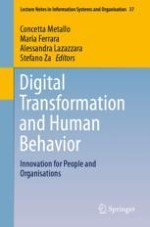2021 | OriginalPaper | Buchkapitel
The Preferred Learning Styles of Generation Z: Do They Differ from the Ones of Previous Generations?
verfasst von : Beatrice Manzoni, Leonardo Caporarello, Federica Cirulli, Federico Magni
Erschienen in: Digital Transformation and Human Behavior
Aktivieren Sie unsere intelligente Suche, um passende Fachinhalte oder Patente zu finden.
Wählen Sie Textabschnitte aus um mit Künstlicher Intelligenz passenden Patente zu finden. powered by
Markieren Sie Textabschnitte, um KI-gestützt weitere passende Inhalte zu finden. powered by
